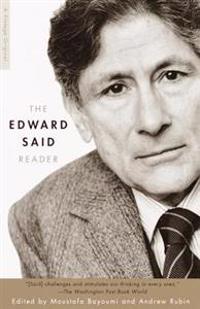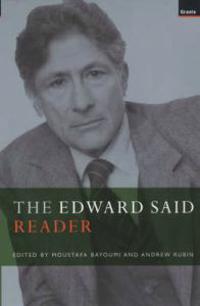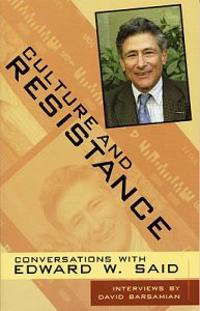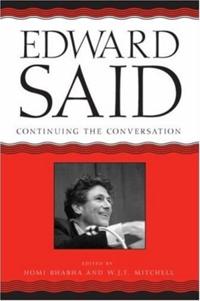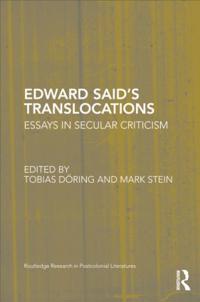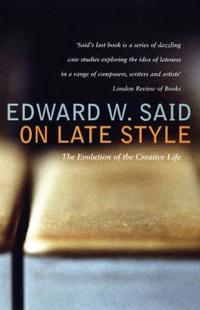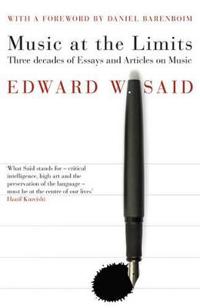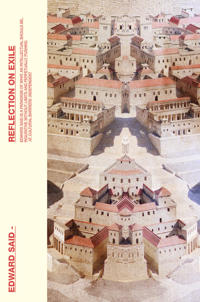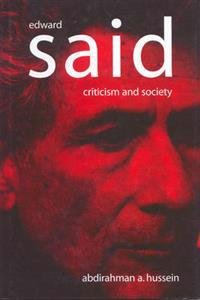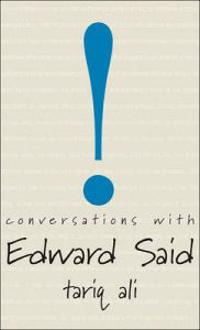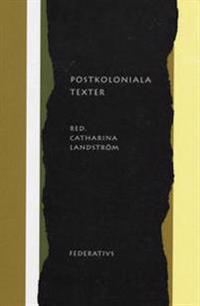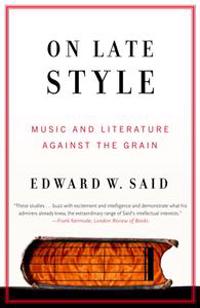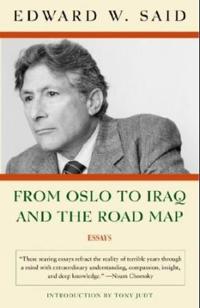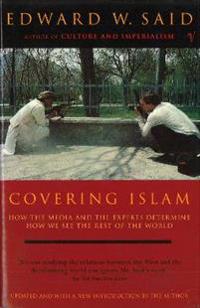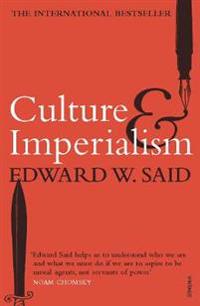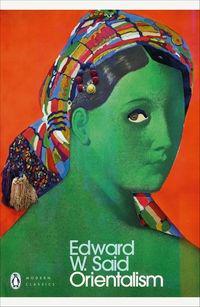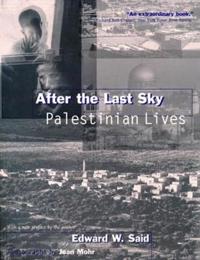The Edward Said Reader (Häftad)
avMoustafa Bayoumi, Andrew Rubin, Edward W. Said
ISBN: 9780375709364 - UTGIVEN: 200009Edward Said, the renowned literary and cultural critic and passionately engaged intellectual, is one of our era's most formidable, provocative, and important thinkers. For more than three decades his books, which include Culture and Imperialism, Peace and Its Discontents, and the seminal study Orie[...]
Edward Said Reader (Häftad)
avEdward W. Said
ISBN: 9781862074453 - UTGIVEN: 2001-10A selecton of key pieces from Said's works, including his groundbreaking 1966 study of Joseph Conrad, through to "Culture and Imperialism", to the recently critically acclaimed memoir "Out of Place".[...]
Culture and Resistance: Conversations with Edward W. Said (Häftad)
avDavid Barsamian, Edward W. Said
ISBN: 9780896086708 - UTGIVEN: 2008-11In his latest book of interviews, Edward W. Said discusses the centrality of popular resistance to his understanding of culture, history, and social change. He reveals his latest thoughts on the war on terrorism, the war in Afghanistan, and the Israeli-Palestinian conflict, and lays out a compelling[...]
Edward Said (Häftad)
ISBN: 9780226532035 - UTGIVEN: 200507In Edward Said: Continuing the Conversation, Edward Said's long-time friends and collaborators continue their dialogue with Said where they left off following his death in the fall of 2003. The essays, imagining and recalling the cadences of Said's conversation, take various forms, including elabora[...]
Edward Said (Övrig)
avPal Ahluwalia, Bill Ashcroft
ISBN: 9780415476898 - UTGIVEN: 2008-10-16Edward Said is perhaps best known as the author of the landmark study Orientalism, a book which changed the face of critical theory and shaped the emerging field of post-colonial studies, and for his controversial journalism on the Palestinian political situation. Looking at the context and the impa[...]
Edward Said's Translocations (Inbunden)
avMichael, III Sullivan
ISBN: 9780415886376 - UTGIVEN: 201204Working with processes of translocation enabled Edward Said to point out interdependence and complementarity across geographical borders and disciplinary boundaries while recognizing cultural difference and the distinct historical experiences of colonizer and colonized. This book brings into focus S[...]
On Late Style (Häftad)
avEdward Said
ISBN: 9780747585602 - UTGIVEN: 2007-05"On Late Style" examines the work produced by great artists - Beethoven, Thomas Mann, Jean Genet among them - at the end of their lives. Said makes it clear that, rather than the resolution of a lifetime's artistic endeavour, most of the late works discussed are rife with contradiction and almost im[...]
Music at the Limits (Häftad)
avEdward Said
ISBN: 9780747598749 - UTGIVEN: 2009-05Music at the Limits brings together three decades of Edward W. Said's essays on music. Addressing the work of a wide variety of composers and performers, Said analyses music's social and political contexts, and provides rich and often surprising assessments. He reflects on the censorship of Wagner i[...]
Edward Said On The Prospects Of Peace In Palestine And Israel (Inbunden)
avJohn Randolph LeBlanc
ISBN: 9781137008466 - UTGIVEN: 2013-11-12In this book, a political theorist reads Said's work, concluding that he preferred 'reconciliation' to segregation in Palestine/Israel. Suitable for scholars and a general audience, this book explores Said's work for what it says about negotiating the troubling, proximate and unsettling presence of [...]
Postcolonialism: Frantz Fanon, R. Radhakrishnan, Edward Said, a Land Without a People for a People Without a Land, Human Zoo, Yehouda S (Häftad)
avLLC Books, LLC Books
ISBN: 9781157025351 - UTGIVEN: 2010-09Observera att förlaget som ger ut denna produkt baserar innehållet i sina produkter på fria källor som Wikipedia. Boken är med stor sannolikhet endast ett utdrag ur dessa informationskällor, alltså inte en vanlig bok i den bemärkelsen.[...]
Reflections on Exile (Häftad)
avEdward Said
ISBN: 9781847085979 - UTGIVEN: 2012-08With their powerful blend of political and aesthetic concerns, Edward W. Said's writings have transformed the field of literary studies. As in the title essay, the widely admired "Reflections on Exile," the fact of his own exile and the fate of the Palestinians have given both form and the force of [...]
Beginnings (Häftad)
avEdward Said
ISBN: 9781847085993 - UTGIVEN: 2012-08A "beginning," especially as embodied in much modern thought, is its own method, Edward Said argues in this classic treatise on the role of the intellectual and the goal of criticism. Distinguishing between "origin," which is divine, mythical, and privileged, and "beginning," which is secular and hu[...]
Edward Said (Häftad)
avAbdirahman A. Hussein
ISBN: 9781859843901 - UTGIVEN: 200408Few public intellectuals have had such a big impact outside the academy as Edward Said. This, the first full-length intellectual biography of the groundbreaking author of Orientalism, reveals some startling observations. Abdirahman Hussein argues that underneath Said's carefully constructed eclectic[...]
Conversations with Edward Said (Inbunden)
ISBN: 9781905422043 - UTGIVEN: 2005-11In his last years, looking back over questions of life, history, exile, identity and Palestine, Edward Said brings his considerable intellect and deep personal engagement to bear on some of the most troubling and volatile issues of our time. In these conversations with Tariq Ali, Said ranges back ov[...]
Postkoloniala texter (Häftad)
avHomi Bhabha, Avtar Brah, Frantz Fanon, Chandra Talpade Mohanty, Edward Said, Gayatri Chakravorty Spivak
ISBN: 9789186474362 - UTGIVEN: 200106Den här boken innehåller texter av författare som har stor betydelse för postkolonial teori och politik. Författarna är Homi Bhabha, Avtar Brah, Frantz Fanon, Chandra Talpade Mohanty, Edward Said och Gayatri Chakravorty Spivak. Forskaren Catharina Landström har valt texterna och skrivit en in[...]
Edward Said and Critical Decolonization (häftad)
ISBN: 9789774160875 - UTGIVEN: 2007-03This book is dedicated to Edward Said (1935-2003), a major literary and cultural critic, who has been instrumental in promoting decolonization through his analytical and critical writing. Scholarly articles tackle various aspects of Said's writing on fiction, criticism, politics, and music, and the [...]
On Late Style: Music and Literature Against the Grain (Häftad)
avEdward W. Said, Mariam C. Said, Michael Wood
ISBN: 9780375726330 - UTGIVEN: 2007-04A collection of essays by the late cultural critic explores great works of music and literature produced by Beethoven, Schoenberg, Mann, Cavafy, Beckett, Gould, Straus, Genet, and others at the end of their creative lives, analyzing how these works differed from previous ones and what they reveal ab[...]
From Oslo to Iraq and the Road Map: Essays (Häftad)
avEdward W. Said, Tony Judt, Wadie E. Said
ISBN: 9781400076710 - UTGIVEN: 200508In his final book, completed just before his death, Edward W. Said offers impassioned pleas for the beleaguered Palestinian cause from one of its most eloquent spokesmen. These essays, which originally appeared in Cairo's "Al-Ahram Weekly, London's "Al-Hayat, and the" London Review of Books, take us[...]
Covering Islam (Storpocket)
avEdward W. Said
ISBN: 9780099595014 - UTGIVEN: 199708From the Iranian hostage crisis through the Gulf War and the World Trade Centre bombing, the West has been haunted by a spectre called 'Islam'. As portrayed by the news media - and by a chorus of government, academic and corporate experts - 'Islam' is synonymous with terrorism and religious hysteria[...]
Culture and Imperialism (Storpocket)
avEdward W. Said
ISBN: 9780099967507 - UTGIVEN: 199801From Jane Austen to Salman Rushdie, and from Yeats to the news coverage of the Gulf War, this is broad account of the roots of imperialism in European culture, and an analysis of the impact of 19th-century British and French imperialism on the culture of the period.[...]
Orientalism (Storpocket)
avEdward W. Said
ISBN: 9780141187426 - UTGIVEN: 200308For generations now, Edward W. Said's "Orientalism" has defined our understanding of colonialism and empire, and this "Penguin Modern Classics" edition contains a preface written by Said shortly before his death in 2003. In this highly-acclaimed work, Edward Said surveys the history and nature of We[...]
Beginnings: Intention and Method (Övrig)
avEdward W. Said
ISBN: 9780231059374 - UTGIVEN: 1985-03-13A "beginning," especially as embodied in much modern thought, is its own method, Edward Said argues in this classic treatise on the role of the intellectual and the goal of criticism. Distinguishing between "origin," which is divine, mythical, and privileged, and "beginning," which is secular and hu[...]
Musical Elaborations (Övrig)
avEdward W. Said
ISBN: 9780231073196 - UTGIVEN: 1993-10-21Filling a significant gap in contemporary cultural studies, Musical Elaborations examines the intersection of the public and private meaning of music. Incorporating the music criticism of Adorno, musical ideas from literary works by Proust, and criticism by Benjamin and de Man into his work, noted [...]
After the Last Sky (Häftad)
avEdward W. Said
ISBN: 9780231114493 - UTGIVEN: 199906This book offers a searing portrait of Palestinian life and identity that is at once an exploration of Edward Said's unclaimable past and a testimony to the lives of those living in exile.[...]

